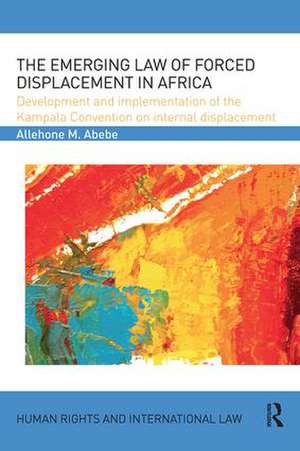The Emerging Law of Forced Displacement in Africa: Development and implementation of the Kampala Convention on internal displacement: Human Rights and International Law
Autor Allehone M. Abebeen Limba Engleză Paperback – 8 iun 2018
This book significantly contributes to the study, policy making and practice on managing internal displacement by presenting the first major systematic examination of the evolution, elements and implementation of the Kampala Convention. It explores the responsibility of the state for the protection of IDPs particularly those who are most vulnerable during armed conflicts, internal strife, natural disasters, human rights violations and other circumstances. The status of ratification of the Convention is reviewed as well as the steps currently being undertaken by governments to implement the Convention. It also analyses the contribution by human rights mechanisms, inter-governmental bodies and UN peace-keeping missions in the implementation of the Convention. The book casts the Kampala Convention in broader institutional and normative developments in Africa and beyond. It demonstrates how concepts such as ‘responsibility to protect’ and ‘sovereignty as responsibility’ have begun to make inroads; influencing some of the more progressive instruments adopted by the African Union. It also sheds light on the relationship between the Convention and some regional instruments. In assessing the effectiveness of the Kampala Convention Allehone Abebe argues that the link between the Convention and initiatives on development, human rights and governance in Africa should be fully fostered.
| Toate formatele și edițiile | Preț | Express |
|---|---|---|
| Paperback (1) | 302.38 lei 6-8 săpt. | |
| Taylor & Francis – 8 iun 2018 | 302.38 lei 6-8 săpt. | |
| Hardback (1) | 850.35 lei 6-8 săpt. | |
| Taylor & Francis – 23 sep 2016 | 850.35 lei 6-8 săpt. |
Din seria Human Rights and International Law
-
 Preț: 319.01 lei
Preț: 319.01 lei -
 Preț: 330.15 lei
Preț: 330.15 lei -
 Preț: 311.41 lei
Preț: 311.41 lei -
 Preț: 389.38 lei
Preț: 389.38 lei -
 Preț: 387.03 lei
Preț: 387.03 lei - 14%
 Preț: 301.55 lei
Preț: 301.55 lei -
 Preț: 381.00 lei
Preț: 381.00 lei -
 Preț: 416.22 lei
Preț: 416.22 lei -
 Preț: 389.38 lei
Preț: 389.38 lei -
 Preț: 387.49 lei
Preț: 387.49 lei -
 Preț: 392.54 lei
Preț: 392.54 lei - 20%
 Preț: 272.02 lei
Preț: 272.02 lei - 17%
 Preț: 259.98 lei
Preț: 259.98 lei -
 Preț: 388.13 lei
Preț: 388.13 lei - 18%
 Preț: 1001.39 lei
Preț: 1001.39 lei - 18%
 Preț: 1006.30 lei
Preț: 1006.30 lei - 18%
 Preț: 1059.93 lei
Preț: 1059.93 lei
Preț: 302.38 lei
Preț vechi: 358.08 lei
-16% Nou
Puncte Express: 454
Preț estimativ în valută:
57.87€ • 62.84$ • 48.61£
57.87€ • 62.84$ • 48.61£
Carte tipărită la comandă
Livrare economică 22 aprilie-06 mai
Preluare comenzi: 021 569.72.76
Specificații
ISBN-13: 9781138623927
ISBN-10: 113862392X
Pagini: 308
Dimensiuni: 156 x 234 x 28 mm
Greutate: 0.59 kg
Ediția:1
Editura: Taylor & Francis
Colecția Routledge
Seria Human Rights and International Law
Locul publicării:Oxford, United Kingdom
ISBN-10: 113862392X
Pagini: 308
Dimensiuni: 156 x 234 x 28 mm
Greutate: 0.59 kg
Ediția:1
Editura: Taylor & Francis
Colecția Routledge
Seria Human Rights and International Law
Locul publicării:Oxford, United Kingdom
Public țintă
Postgraduate and UndergraduateCuprins
1. Introduction 2. The protection of and assistance to IDPs under international law 3. The evolution and scope of regional norms and institutions on internal displacement in Africa 4. The Kampala Convention: Rationale, Preparatory Work and Legal Resource 5. Substantive Provisions of the Kampala Convention 6. Implementation and its challenges 7. Conclusion
Descriere
The first-ever continental binding treaty on internal displacement the African Union Convention on the Protection of and Assistance to Internally Displaced Persons (the Kampala Convention) entered into force on 6 December 2012. This book examines the development and implementation of this treaty on internal displacement. The book explores the responsibility of the State for the protection of IDPs in light of the Kampala Convention and how this relates to the notion of sovereignty. The status of ratification of the Convention is reviewed as well as the steps currently being undertaken by governments and other bodies to implement the Convention.














